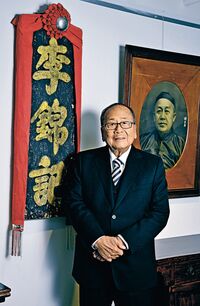Lee Kum Sheung invented oyster sauce by accident when he overcooked some bivalves 130 years ago, conjuring the sweet-and-salty condiment that would become a staple of Cantonese cuisine.
His heirs aren’t leaving anything to chance as they work to succession-proof one of Asia’s wealthiest family dynasties.
Now stretching into its fifth generation, Hong Kong’s Lee Kum Kee group has become an instructive case study for ultra-rich Asian families who’ve amassed unprecedented fortunes in recent years.
Many are dealing with succession issues for the first time, trying to avoid the Chinese adage that “wealth does not go beyond the third generation.”

The Lee family introduced an unusually comprehensive governance system in the early 2000s after the current patriarch, Lee Man Tat, endured battles for control with his uncles and later his brother. The clan nearly split for a third time in the late 1990s after Lee’s youngest son threatened to strike out on his own.
Family leaders, who sit atop a fortune of about USD$15 billion, are now adapting their governance system to appeal to a younger generation of 14 scions that has shown some signs of waning interest.
Recent initiatives include turning business units such as the group’s venture capital arm into a training ground and taking family members on “innovation trips” to places like Silicon Valley and Israel. The lofty goal: keep the business thriving for 1,000 years.
The group’s efforts “resulted in their survival into the fifth generation, a feat unmatched in all but a rare few family businesses,” said Jennifer Pendergast, executive director of the Center for Family Enterprises at Northwestern University’s Kellogg School of Management, which published a case study on the Lees in 2016 and provided training to some family members.

Lee Man Tat, 89, first took the helm almost 50 years ago. After settling the dispute with his uncles, he gave his brother equity and invited him to help lead the company.
But their corporate visions diverged in the 1980s and Lee Man Tat ultimately regained full ownership, according to the Kellogg School case study.
His children joined the business around the same time, after earning degrees in the U.S., including in food science, chemical engineering, marketing and finance.
The family governance push took on fresh urgency after dual crises in the late 1990s, when Asia was mired in a financial meltdown and Lee Man Tat’s youngest son, Sammy Lee, threatened to leave the family business, according to a biography, with a foreword by Lee Man Tat.
The group created a family council in 2002 that set the groundwork for a family office, a family constitution, a family foundation and a family learning center.

Among rules in the constitution: Only those in the bloodline can own shares; the group can’t hire in-laws; and younger heirs are required to work outside of the family business before returning.
An electronic display at the headquarters of one of the group’s units recently showed the council had met 65 times over the past 16 years, 215 days and 17 hours.
Today, Lee Kum Kee group’s businesses span much more than sauces, a unit that has involved leadership of Lee Man Tat’s sons Charlie and Eddy.
The group is involved in everything from real estate to health care and venture capital. It bought London’s Walkie Talkie tower in a record-breaking USD$1.7 billion deal in 2017, and is developing a Guangzhou headquarters designed by the late Iraqi-British architect Zaha Hadid, the first woman to receive the Pritzker Architecture Prize.
LKK Health Products Group, led by Sammy, has arguably surpassed the sauce business to become the group’s crown jewel. Its Infinitus Co. unit has revenue of about USD$4.5 billion, making it the largest direct-selling business in the world after Amway, Avon and Herbalife Nutrition, according to Direct Selling News. Its products include health tonics, tea mixes and skin-care products.
It’s also the largest such business of its kind in China, which can bring risks. Chinese state media this year reported that authorities ordered an investigation into false advertising by a dealer of Infinitus products whose client suffered a heart attack.
The company was not charged. In another case in 2016, however, a court ordered Infinitus and one dealer to compensate a man whose wife died.
The real test for Lee Kum Kee will be whether the new generation can sustain the business once Lee Man Tat retires, said Joseph Fan, a finance professor at Chinese University of Hong Kong.
His research shows that Chinese family succession issues are associated with the loss of more than half of the value of publicly traded businesses.
According to the Kellogg School study, which focused on the period around 2013, Lee Kum Kee’s fifth generation showed waning interest in the business, with few taking advantage of internships or mentoring.
Several even asked to be removed from the mailing list for company updates. In 2011, the family retreats were suspended owing to lack of interest.
The past few years have seen signs of a pickup in engagement, according to Eric Ng, managing director at the group’s venture capital arm, Happiness Capital, whose investments include Beyond Meat and Omnipork of Green Monday, a Hong Kong-based group.
source: www.bloomberg.com
MARKETING Magazine is not responsible for the content of external sites.










